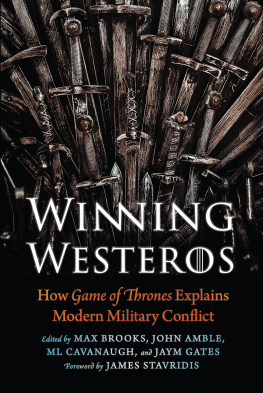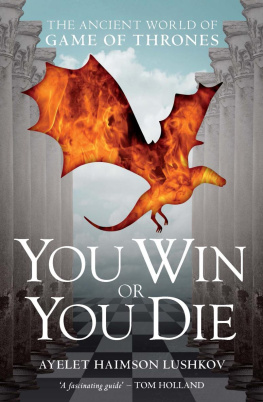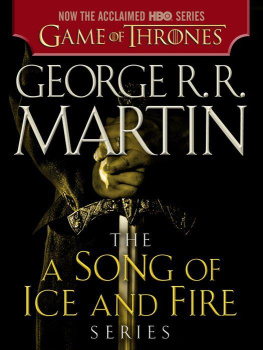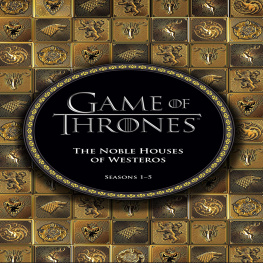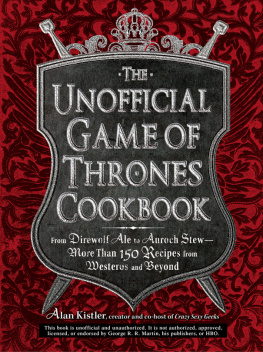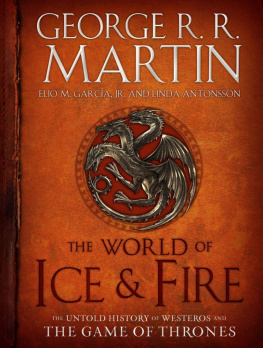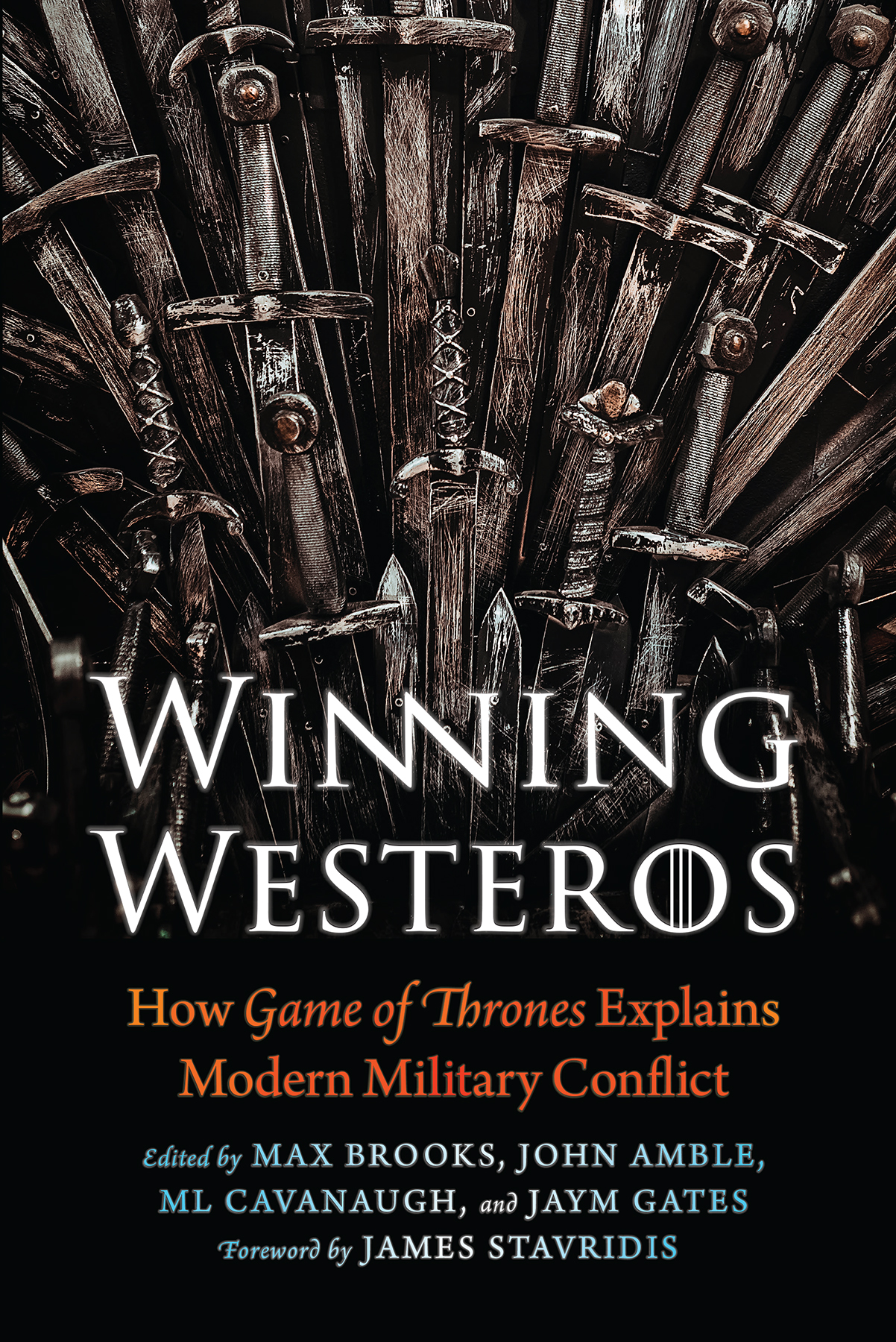
Winning Westeros makes understanding military history and strategy accessible and fun. These incisive and creative essays help readers think clearly about diplomacy, conflict, warfare, and the range of complex competitions that influence our security and prosperity today.
Lt. Gen. (Ret.) H. R. McMaster, former national security advisor and author of Dereliction of Duty
Praise for Strategy Strikes Back: How Star Wars Explains Modern Military Conflict, edited by Max Brooks, John Amble, ML Cavanaugh, and Jaym Gates
Illuminating.
Lawrence D. Freedman, Foreign Affairs
Over the course of history, our single greatest vulnerability has been a failure of imagination. Strategy Strikes Back confronts that vulnerability. The future may not evolve precisely as these authors suggest, but evolve it will. As it does, we will discover that some of tomorrows challenges will prove to be timeless, and others, surprisingly new. Learning to imagine now will be time well spent.
Gen. Martin Dempsey, former chairman of the Joint Chiefs of Staff
You might be forgiven for thinking the never-ending Star Wars franchise was simply a cash cow built of sequels, spin-offs and toys. But the space saga is actually helping further the discussion about military strategy right here on Earth.
Chad Jones, San Francisco Chronicle
Star Wars is just as much a foundational mythology of our time as The Iliad was a long time ago. Strategy Strikes Back ingeniously uses that world far, far away to help readers take a look at our wars here today.
P. W. Singer, best-selling author of Wired for War and coauthor of Ghost Fleet: A Novel of the Next World War
Anyone with a basic knowledge of the Star Wars universe is sure to enjoy the creative parallels used by these esteemed authors to simplify complex topics. Avid fans with deep knowledge of this universe cannot help but embrace these parallels, think through them more deeply, and dig even deeper into them as they try to support or argue against the authors while also showing off their superior knowledge of their favorite series of movies.
Steve Luczynski, Strategy Bridge
This may be the most innovative and interesting book on military strategy ever published.... This volume takes a completely different approach to explaining both the eternal nature and modern intricacies of strategy, politics, and conflict by using the popular Star Wars movies as a common frame of reference for discussing the many issues and challenges modern practitioners of the strategic arts face.
Jerry Lenaburg, New York Journal of Books
Strategy Strikes Back highlights what good science fiction and serious reflection on pop culture can do: bring the (strategic) dilemmas of the current age into stark relief.
Erin Simpson, War on the Rocks
Winning Westeros
How Game of Thrones Explains Modern Military Conflict
Edited by Max Brooks, John Amble, ML Cavanaugh, and Jaym Gates
Foreword by James Stavridis
Potomac Books
An imprint of the University of Nebraska Press
2019 by Max Brooks, John Amble, ML Cavanaugh, and Jaym Gates
Potomac Books is an imprint of the University of Nebraska Press.
Cover designed by University of Nebraska Press; cover image iStock.com / A_Z_photographer.
All rights reserved.
Library of Congress Cataloging-in-Publication Data
Names: Brooks, Max, editor. | Amble, John, editor. | Cavanaugh, ML, editor. | Gates, Jaym, editor. | Stavridis, James, writer of foreword.
Title: Winning Westeros: how Game of thrones explains modern military conflict / edited by Max Brooks, John Amble, ML Cavanaugh, and Jaym Gates; foreword by James Stavridis.
Description: [Lincoln]: Potomac Books, an imprint of the University of Nebraska Press, [2019] | Includes bibliographical references.
Identifiers: LCCN 2019001186
ISBN 9781640122215 (cloth: alk. paper)
ISBN 9781640122369 (epub)
ISBN 9781640122376 (mobi)
ISBN 9781640122383 (pdf)
Subjects: LCSH : Game of thrones (Television program) | Strategy on television. | Military weapons on television.
Classification: LCC PN 1992.77. G 35 W | DDC 791.45/72dc23
LC record available at https://lccn.loc.gov/2019001186
The publisher does not have any control over and does not assume any responsibility for author or third-party websites or their content.
Contents
James Stavridis
Max Brooks
Jonathan P. Klug
Liam Collins
Joe Byerly
Rick Montcalm
Erica Iverson
Kelsey Cipolla
P. W. Singer and ML Cavanaugh
Jonathan E. Czarnecki
Nina A. Kollars
Magnus F. Nordenman
Michael Junge
Bryan McGrath
John Spencer
Lionel Beehner, Benedetta Berti, and Mike Jackson
Mick Cook
J. Daniel Batt
Gregory S. Drobny
Joshua D. Powers and Jonathan Bott
Andrea N. Goldstein
Jess Ward
Steve Leonard
Chuck Bies
Jaym Gates
Andrew A. Hill
Theresa Hitchens
Mick Ryan
Craig Whiteside
ML Cavanaugh
Paul Scharre
ML Cavanaugh
James Stavridis
During my long career in the U.S. Navy, and especially when I was a young naval officer, my reading habits were defined by two types of books: history and fiction. The first gave me a flavor for the rich tradition of naval service across the centuries, from Themistocles at Salamis to Nelson at Trafalgar to Nimitz in the Pacific. Every sailor knows the stories of these admirals and their battles, and they likewise became for me inspirational characters whose standards I tried to match, as well as strong links in the long chain of naval history and tradition. From them, I learned what it meant to be a fighting sailor.
But it was from novels that I learned how to be a naval officer. Where histories and biographies naturally focus on the great admirals and their fleets, Patrick OBrians Master and Commander series gave me much more particular insight into the challenges faced by ships and their captainsin our own time just as much as in Nelsons navy. Great novels like OBriansor Michael Shaaras The Killer Angels or Nicholas Monsarrats The Cruel Sea or even classic poems like The Odysseyengaged my mind in a different way and trained me to raise my sights from asking, What happened? to asking, What if... ?
What-if questions are the root of strategic thinking. Because the outcomes are not a matter of historical record, I have always found these questions easier to ask when reading works of fiction. Tracing the imaginary career of Captain Jack Aubrey through OBrians novels, I constantly asked myself what I would do in the situations he faced. Time and again, I found that this mental exercise paid off when I encountered similar situations in real life. The Aegis destroyers I sailed in might have been much more high-tech than the wooden men-of-war of Captain Aubreys day, but the challenges of discipline, the tension of preparing for battle, and the pressures of command are enduring elements of naval life.
This idea, of course, applies equally well to film and television. There is much leadership to be gleaned in superb films like The Caine Mutiny Court Martial or long-format television such as The Winds of War. In todays world of series television, there is no more global strategic plotline than that of Game of Thrones. The series follows the exploits of a series of contenders for control of a fictional world. There is significant geopolitical and leadership theory, some magic and witchcraft, angry but tamable dragons, walking dead, much swordplay, brutal intrigue, and family quarrels. If you simply equate the magic and the dragons to emerging technology, the tamable dragons to nuclear weapons, and the swords to guns, it is easy to find yourself in the world of global strategy.
Next page
